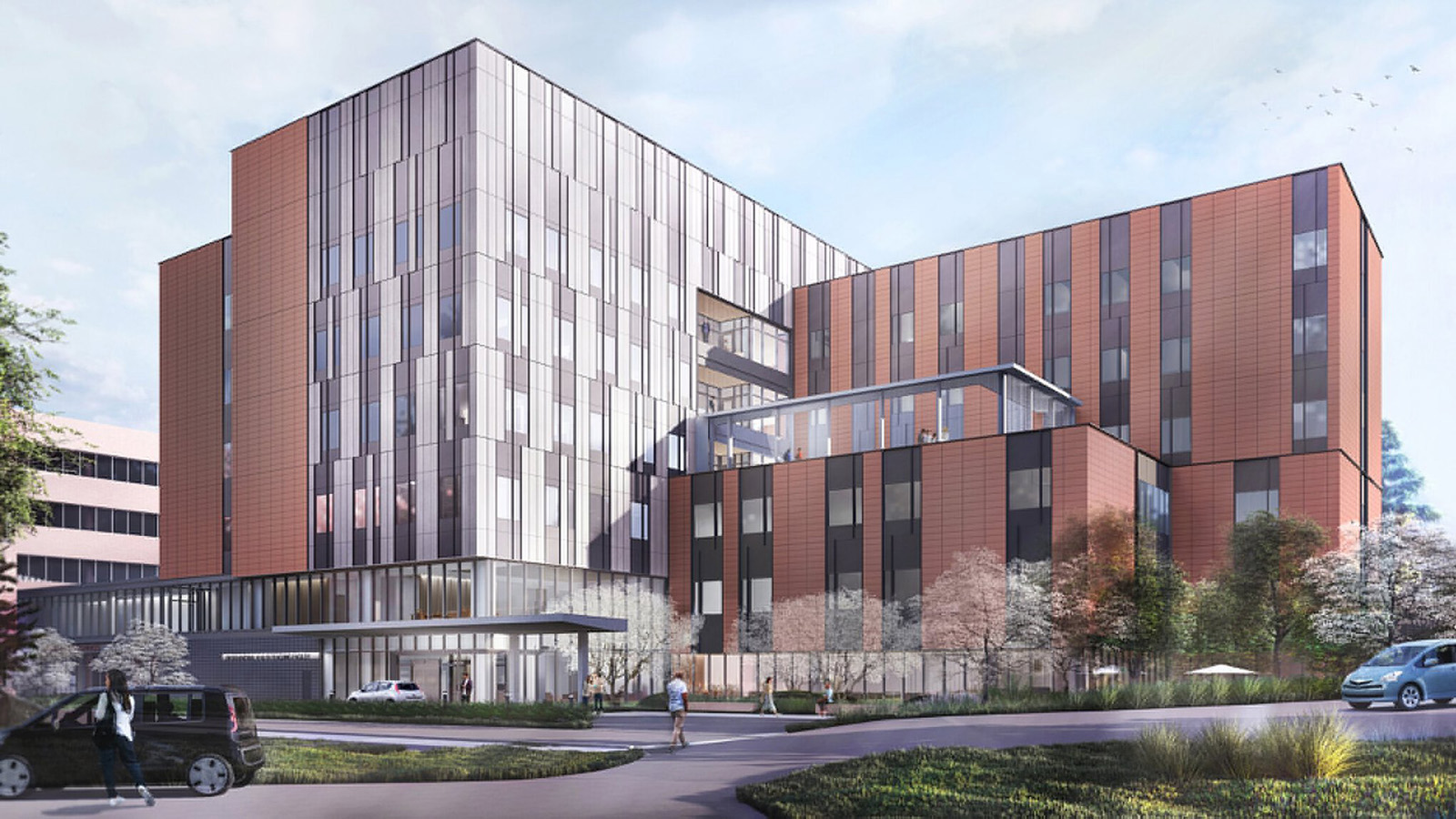On October 15, a joint venture comprised of the general contractors Clark Construction and JR Abbott Construction ceremonially broke ground for the new Behavioral Health Teaching Facility at the University of Washington’s Medical Center-Northwest campus in Seattle.
The six-story 184,000-sf facility, designed by SRG Partnership, is scheduled to open to residents in December 2023, according to the Seattle Times. Funded through $234 million in state appropriation, the facility is being built adjacent to the campus’s main hospital wing.
According to the University, the new building will have a 150-bed capacity, with 75 long-term civil commitment beds, 25 geropsychiatric beds, and 50 licensed med-surgery beds with the capacity to treat patients with psychiatric diagnoses and/or substance use disorders. Its top three floors will feature highly flexible inpatient units designed to respond to client needs from highly structured programs to programs that promote independent functioning and a transition to the community.
TELEPSYCHIATRY SERVICES A KEY COMPONENT
The project team and the University are calling this building one of a kind, in that it will provide a fully integrated and welcoming healing environment for patients struggling with physical and behavioral health problems. The building will include a procedural area for electroconvulsive therapy, and neuromodulation where patients can be treated with brain simulation therapy.
Also see: California University of Science and Medicine’s new School of Medicine
Brett Earnest, Clark’s Senior Vice President, says his firm has been working with the university for nearly two years to develop the facility, which when completed will serve as the home for the statewide 24/7 telepsychiatry consultation program and an interdisciplinary training and workforce development program focused on preparing and supporting the next generation of behavioral health providers for Washington State.
The Building Team is working under an Integrated Project Delivery contract. Its members include KPFF Consulting Engineers, Thornton Tomasetti, Ricca Design Studios, OJB Landscape Architecture, Mazzetti, PAE Engineers, McKinstry, VECA Electric, Schuff Steel, Performance Contracting Inc., and Queen City.
RECONNECTING MIND AND BODY
The Seattle Times reports that patients will have access to terraces and decks, sleep in secured private bedrooms, and meet with physicians and other staff in spacious treatment areas. Terracotta tiles will flank the building’s outer structure. Common spaces will feature calming muted colors. Outdoor benches will be crafted from reclaimed trees. The first floor of the building will house a public dining hall for staff and visitors.
Carl Hampson, SRG’s Design Principal, told the newspaper that choices for materials and fixtures were prioritized based on patient safety criteria. The building’s design, created in collaboration with our clinical stakeholders, will promote healing and well-being, “reinforcing the connection between mind and body,” Hampson said.
Related Stories
| Aug 11, 2010
Portland Cement Association offers blast resistant design guide for reinforced concrete structures
Developed for designers and engineers, "Blast Resistant Design Guide for Reinforced Concrete Structures" provides a practical treatment of the design of cast-in-place reinforced concrete structures to resist the effects of blast loads. It explains the principles of blast-resistant design, and how to determine the kind and degree of resistance a structure needs as well as how to specify the required materials and details.
| Aug 11, 2010
AIA selects three projects for National Healthcare Design Awards
The American Institute of Architects (AIA) Academy of Architecture for Health (AAH) have selected the recipients of the AIA National Healthcare Design Awards program. The AIA Healthcare Awards program showcases the best of healthcare building design and healthcare design-oriented research. Projects exhibit conceptual strengths that solve aesthetic, civic, urban, and social concerns as well as the requisite functional and sustainability concerns of a hospital.
| Aug 11, 2010
Gensler, HOK, HDR among the nation's leading reconstruction design firms, according to BD+C's Giants 300 report
A ranking of the Top 100 Reconstruction Design Firms based on Building Design+Construction's 2009 Giants 300 survey. For more Giants 300 rankings, visit http://www.BDCnetwork.com/Giants
| Aug 11, 2010
RSMeans/RCD forecast 14% drop in hospital construction for 2009
RSMeans forecasts a 14% drop in hospital construction in 2009 compared to 2008, with $17.1 billion in registered hospital projects as of June 30, 2009. The Reed Construction Data unit finds renovation of healthcare facilities increasing, from 36% of projects in 2008, to 40% of projects in the pipeline in the first six months of 2009.
| Aug 11, 2010
ASHRAE introduces building energy label prototype
Most of us know the fuel efficiency of our cars, but what about our buildings? ASHRAE is working to change that, moving one step closer today to introducing its building energy labeling program with release of a prototype label at its 2009 Annual Conference in Louisville, Ky.
| Aug 11, 2010
10 tips for mitigating influenza in buildings
Adopting simple, common-sense measures and proper maintenance protocols can help mitigate the spread of influenza in buildings. In addition, there are system upgrades that can be performed to further mitigate risks. Trane Commercial Systems offers 10 tips to consider during the cold and flu season.
| Aug 11, 2010
McCarthy, Skanska among nation's largest healthcare contractors, according to BD+C's Giants 300 report
A ranking of the Top 50 Healthcare Contractors based on Building Design+Construction's 2009 Giants 300 survey. For more Giants 300 rankings, visit http://www.BDCnetwork.com/Giants







